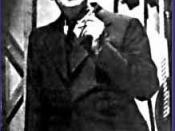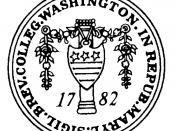Biography of James M. Cain On July 1, 1892 James Mallahan Cain - the first of five children "àwas born. At age six he entered school in Annapolis and also met his best friends, Henry Hopkins. They remained friends until Cain's death in 1977. As a child Jamie loved to read and was often teased by other students. Professor Clarence W. Stryker, a member at St. John's faculty, recognized Cain's passion and introduced him to Alice in Wonderland, which to the end of his life remained his favorite novel. Cain surrounded himself with Alice, The Jungle Books, Tales of Peter Rabbit, and The Adventures of Sherlock Holmes. "These were his favorites, and he would read them over and over again ["æ] Of all the books he read when he was young, these early favorites were the ones that lived"à(Hoopes 10). Now head of the Annapolis School Board, Jim Cain (Cain's father) was proud of his wunderkind and arranged it so that Cain was moved ahead from third grade to fifth.
"["æ] Cain later thought the move was possibly the worst thing that ever happened in his childhood, and he regretted all his life that his father did not have enough sense to veto it"à(Hoopes 12). Cain grew up in Annapolis, Maryland until the summer of 1903. Dr. Jim Cain was going to be the president of Washington College in Chestertown, Maryland.
Life in Chestertown was worse than in Annapolis. When he entered the Chestertown public school, he was in the seventh grade on the Eastern Shore, which was part of high school. His classmates knew he had a lot of talent but made fun of him by calling him "Pedro"ÃÂ for unknown reasons. In 1909 the Pegasus (college yearbook) said "Pedro, the awkwardest man of the class, runs the track like a turkey, with both wings broken"ÃÂ (qdt. in Hoopes 25). But the yearbook also showed how active and involved he was in school. He was a member of the Adelphia Literary Society, vice-president of his class in 1907-1908, a member of the Glee and Mandolin clubs, class historian in 1909 and 1910, literary editor of the Pegasus in 1909 and 1910, and class poet.
After graduating from Washington College in 1910, Cain was inspired to become a professional opera singer by his mother. In 1913 he moved to Washington D. C. and studied singing. Voice lessons confirmed that he would never become an opera singer, and while sitting on a bench in Lafayette Park in Washington he came to the conclusion that he would become a writer. He returned to Chestertown in 1914 and started to teach English and mathematics at Washington College for his father. While teaching he got his master's degree in 1917.
Between 1917 and 1923 he was a reporter for first the Baltimore American and then for the Baltimore Sun, enlisted as a private in the army during WWI and edited The Lorraine Cross for the 79th Division, married Mary Rebekah (divorced in 1923), and became a professor at St. John's.
Through 1924 and 1931 Cain was a struggling writer. He had a couple of articles published in newspapers and magazines. He would skip from one paper to another hoping to get bits and pieces published. He would marry a second time to Elina Sjoster Tyszecka of Finland but only to end up in divorce after just three years. In 1931 he became the managing editor of The New Yorker and stayed there for ten months. Later that year he moved to Hollywood and would remain there for seventeen years, writing scripts for Paramount, Columbia, Metro-Goldwyn-Mayer, Warner Brothers, Universal, and continued to articles and syndicated columns.
At forty-two Cain's first novel, The Postman Always Rings Twice, was published in 1934. But getting out in the open was the hard part. Cain was devastated to hear that his novel was rejected from Knopf, a publisher in New York. Knopf had written back to Cain saying that it was good story but it needed to be tinkered with a bit. First the novel was too short. It was only 35,000 word and not at lest 40,000. Knopf also didn't like the original title, Bar-B-Que. What hurt most was what Knof wrote in the last paragraoh in the letter. "You have done some superb things for Henry Mencken ["æ] and I think it is only a matter of time before you reach out into more sustained efforts that will be capable of making some real money as books"à(qtd. in Hoopes 235) Frank would stay mad for years but his novel was finally published after a lot of persuasion towards Knopf.
After The Postman, Double Indemnity followed in 1936. Cain continued to write more and more but none of his later writings would have the same impact of The Postman. Both novels would later become Hollywood movies. He would marry again to actress Aileen Pringle in 1944 and divorce her the following year. "In 1946 Cain organized American writers into American Authors Authority, which would serve as a repository for all copyrights. He also married his fourth and final wife Florence Macbeth, opera singer, and move back to Maryland, where he remained for the rest of his life.
Between 1947 and up to his death in 1977 he published nine more novels that includes, The Moth, The Roots of Evil, The Magician's Wife, and The Institute. It has been said that Cain has never been proud of his accomplishments because he never lived up to his expectations. He was a man that believed, despite all achievements, did so little and was a failure. Cain died on October 27, at the age of eighty-five at his home in Hyattsville, Maryland.
The Postman Always Rings Twice The narrative structure of the book is told in first person and in chronological order. The time frame spans for about a year or so. Frank Chambers is the main character, who's the rough but smart type. He falls in love with a woman named Cora and his passion for her makes him crazy of love. Cora has to choose between her husband, the Greek (he's always referred to as the Greek in the book), and Frank. She chooses Frank.
The story is set in Southern California near the Los Angles County. Frank is a drifter that hitches his way to a place called Twin Oaks Tavern. It has a living part, for Cora and the Greek, a filling station, and a lunchroom part. When Frank walks in to get a bite to eat, he quickly notices Cora and becomes intrigued by her. He talks to the Greek, Cora's husband, and the Greek offers him a job as a mechanic. Frank accepts the offer and his affair with Cora starts immediately. They made love every time the Greek wasn't home. As their affair continued they realize that they are in love and come up with the notion that in order for them to be together forever, they must kill the Greek. "That's it, Frank. That's all that matters, isn't it? Not you and me and the road, or anything else but you and me"ÃÂ (Crime 13).
The plan was to make the murder seem like an accident. They were to kill the Greek in the bathroom, so it would appear as though he slipped, hit his head, and drowned in the bathtub. But the plan failed. Cora hit the Greek on his head but the lights had gone out, Cora panicked, and didn't put his head under water. When the police arrive Frank tells them it was an accident. What saves them is that a cat had hopped onto the fuse box outside and fried the circuits. "Stepped right off the ladder on to the fuse box. Well, that's the way it goes. Them poor dumb things, they can't get it through their heads about electricity, can they? No sir, it's too much for the them"ÃÂ (Crime 19). Because of this coincidence the cops buy their story.
After a week in the hospital the Greek comes home and he is instantly famous. The story is everywhere and people come in to see him. Because of his popularity the Greek isn't home much and Frank and Cora make the best of this. Soon they both decide to just pack their things and leave. As they make their way down the street Cora can't through with it and she wants to go home. So she does.
Frank catches a ride to San Bernardino and stays there making money buy hustling pool player. Three weeks later he runs into the Greek at a market. They talk and the Greek asks him to come back to the lunchroom and start working again. Frank accepts his offer. They leave the town together and drive to the lunchroom. Frank meets Cora and their passion for each other ignites again. They soon make another plan to kill the Greek and run away together.
This time it an elaborate "car accident"ÃÂ plan. It works and the Greek is killed. At first the judge doesn't believe the car accident story because of some insurance policies worth $20,000. Mr. Sackett, the prosecuting lawyer, interrogates Frank and convinces him to sign a confession statement, saying that it was Cora's idea to kill the Greek. But the defense lawyer, Mr. Katz, digs deep and convinces the judge plead them not guilty.
Frank and Cora stay together and start a beer business and make a good fortune out of it. Soon Frank starts to get restless and wants to leave. Cora doesn't agree and wants to stay at the lunchroom. A telegram arrives saying her mom is ill and Cora leaves to be with her. Franks is left alone at the lunchroom and runs into a woman named Madge Allen. He helps her with her car and in that same day they decide to ride off together. Frank closes the shop and goes with Madge to Ensenada, Mexico. She tells him about how she raises pumas and sells them to zoos or get rich buyers to purchase them. Their affair doesn't last long and Frank goes back to California.
Cora comes back and her mother has died. Frank and Cora decide to close the lunchroom and take a vacation down to Santa Monica. While they are swimming in the ocean Cora starts to feel weak and Frank swims her ashore. She tells Frank that she is pregnant and that she's scared that she might have put to much strain on her body and kill the baby. Frank tells her not to worry and carries her to the car. They had passed a hospital while driving to the beach and Frank starts to drive towards it. Frank tries to overtake a big truck that is ahead of him on the road. It has a sign on the back that reads, "Sound Your Horn, the Road Is Yours."ÃÂ Frank tries to pass on the left but too many cars are coming towards him. "I pulled out on the right and stepped on it. She screamed. I never say the culvert wall. There was a crash, and everything went blank"ÃÂ (Crime 92) Frank survives the crash and Cora dies. He is charged with the murders of the Greek and Cora and is found guilty. The motive for the crime was the insurance money that Cora had received preceding the Greeks death.
Frank is in prison confessing his story to Father McConnell. Just before the prison guards pick up Frank to be executed, Frank asks the father to send a prayer up for him and Cora. "["æ] Make it so that we're together, wherever it is"à(Crime 95).
Raves and reviews I ripped all her clothes off. She twisted and turned, slow, so they would slip out of them under her. Then she closed her eyes and lay back on the pillow. Her hair was falling over her shoulders in snaky curls. Her eyes was all black, and her breasts weren't drawn up and pointing up at me, but soft, and spread out in two big splotches. She looked like the great grandmother of every whore in the world. The devil got his money's worth that night. (Crime 71) The Postman had a lot of sexual and violent content. Because of such content the book was banned from Canada and Boston. There is another scene where Cora and Frank had just killed the Greek and have sex right next to the dead body. Cora tells Frank to "rip"ÃÂ her clothes off and he does. Most critics of the 1930's and 40's felt that Cain's writing style was too obscene and brutal for readers. It was of the times. But some believed that it was exactly that. " The Postman Always Rings Twice is a short, meretricious but exciting book; it does not pretent to tell the whole story, but it does pretend to tell nothing but the truth"ÃÂ (New Republic). Cain wasn't afraid to write about the mythologies of America and the ideals and hatreds without complicating them in the difficulties of art.
Mr. Cain is to be congratulated upon making his exciting and disagreeable novel carry conviction. His style is like the metal of an automatic. You can't lay his story down, for all its brutality and ugliness. He is good at dialogue, too. In the hard-boiled school of today here is a new student of considerable promise. (Benet 503) The Postman is a book that sticks the reader. It was a predictable book but they way it was told had a different appeal to it. Cain wasn't afraid to write the way he did. "Postman is characteristic of many Cain novels in its depiction of sex enhanced vividly and palpably by the elements of violence, food, drunkenness, and relatively genuine love"à(Madden 77). He had a lot of passion in him for he was a man that kept a lot inside from the world but get let it out in his writing. He liked to pretend to be someone else through his stories. He was a sensitive man that got annoyed by reviewers who spent columns pointing out why his books were no good while the public was buying them by the thousands. To say that it was too violent and sexual would strip the book of its character. The book was just ahead of its time and couldn't be appreciated the way it is today. Cain was most fond about his childhood for he liked to escape to the world of Alice's wonderland. Cain once said: "["æ] That the aim for art is to cast a spell over the beholder. Oscar Wilde said that. Well, if the book casts a spell, you can't put it down, and if that's the only object the book has, to say it's no good because it achieves its end "æ I'm bewildered"à(qtd. in Hoopes 556).
Work Cited Benet, William R., "Hard-Boiled Jellyfish,"ÃÂ Saturday Review, 24 February 1934.
Crime Novels: American Noir of the 1930's and 40's, The Postman Always Rings Twice, Literary Classics of the United States, Inc., New York, N. Y., 1997.
Hoopes, Roy, Cain: The Biography of James M. Cain, Holt, Rinehart and Winston, 1982.
Madden, David, James M. Cain, Twayne Publishers, inc., 1970.
New Republic, http://www.goblinmarket.com/goblin/classics/postman.htm, February 28, 1934.





